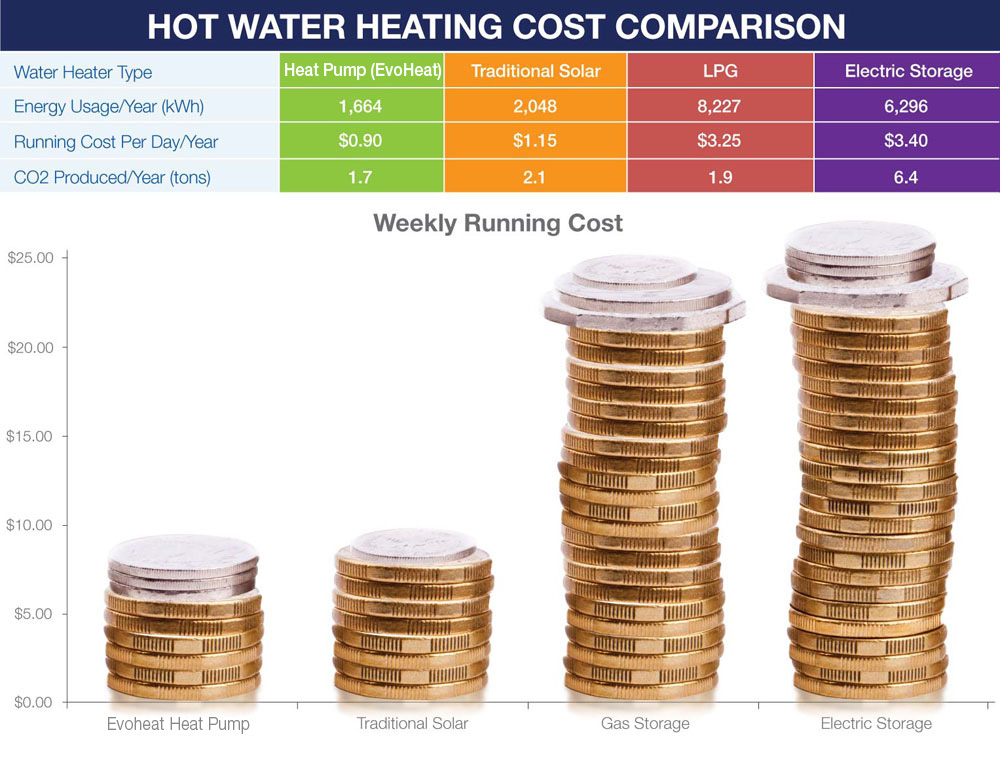Choosing the best Hot Water System for your situation can be a difficult task. Whilst purchase price is a major consideration, these days there is more emphasis on how the product will save you money in the long term, such as water saving technology and energy efficiency. A Hot Water System is generally seen as a product that will last for a number of years so it’s important to make the right decision when you do purchase a new one.
When selecting a hot water system it’s important to consider:
- Number of bathrooms and/or people that may use hot water at once
- Number of Adults / Teenagers / Small Children in the home. Small Children will use the least hot water, as for the teenagers only a parent can answer that one!
- Dishwashers and Washing Machines connected that use hot water at the same time.
- Requirements to fill large bathtubs or spa baths using hot water
- Whether to upgrade to a more cost / energy efficient technology
In addition to those factors there are more technical aspects of hot water use such as the the available water pressure in your region, the water conditions and the climate.
Hot Water System Comparison
Electric
Traditional Choice-
Wide Range of Manufacturers
-
Low Initial Cost
-
Parts Readily Available
-
Expensive To Run
Heat Pump
Energy Efficient-
Cheap to Run
-
Latest Technology
-
Environmentally Friendly
Solar
Energy Efficient-
Cheap to Run
-
Environmentally Friendly
-
Excessive Weight on Roof
-
Poor Access for Maintenance
-
Expensive to Install
Gas / Instantaneous
Instant Hot Water-
Cheap to Run
-
Environmentally Friendly
-
Expensive to Install
Hot Water System Running Costs Comparison
Below is a good example of how a heat pump hot water system can save you money on your electricity bill.

Types of Hot Water System - Additional Information

We installed this Quantum Heat Pump Hot Water System at a Mermaid Waters property after their old rheem had failed. The customer will save big dollars on their hot water bills with the energy efficient heat pump technology.
There are basically 5 different options you have to select from when buying a new hot water system.
1) Heat Pump: Heat pumps have recently become a more viable technology as their reliability has improved and so has their prices in general. We install heat pumps by leading brands including EvoHeat as they are leaders in the technology. At Speedy Hot Water we highly recommend considering a Evo Heat heat pump hot water system if your old electric system fails due to the savings in power bills that can be achieved.
2) Natural Gas : In the past, this was the best option to go for if you have natural gas available in your area, however heat pump has taken over as the most cost effective option.
3) Liquid Petroleum Gas : LPG is actually the most expensive to run. Even though it is not so bad for the environment, it is pretty steep on the pocket.
4) Electric: Electric hot water systems are the most common ones. While they are cheap to run, it is not so good for the environment unless you are on a cheaper tariff. If you are on a cheaper tariff you are actually using the electricity that is going to waste! Mainly there are 3 tariff options to choose from. A11, T31, T33.
A11: This is your normal power that is turned on 24 hours a day.
T33: This means that your hot water system is turned on for 18 hours a day. Your electricity to the hot water system will be turned off during the peak periods, generally in the afternoon. You need at least a 125LT hot water system to be on this tariff.
T31: This means that your hot water system is turned on for 10 hours a day. Your hot water system heats up during the nighttime. This tariff is the cheapest and less than half price compared to the A11. It is also better for the environment because you are using the electricity without raising the peak demand. You need at least a 250LT hot water system to go on this tariff.
The information above applies to Queensland only. You should contact your retail electricity supplier for the latest and detailed accurate information.
5) Solar : Solar hot waters systems are pretty expensive to buy and moderately expensive to run. They run from the power of the sun, but need to be boosted sometimes when you run out of hot water, or when there is no sun. So for about a quarter of an year be prepared to boost your hot water system. You can have it boosted by electricity or gas.

